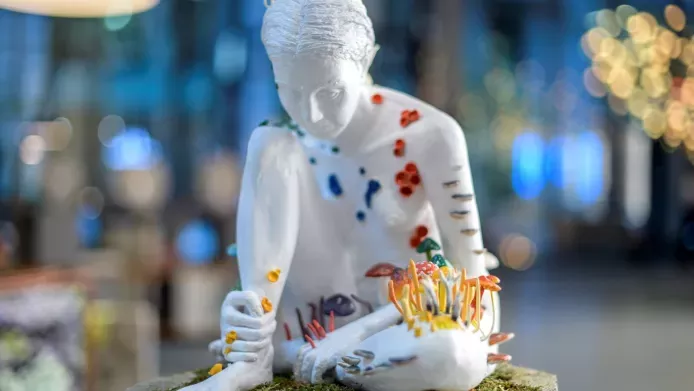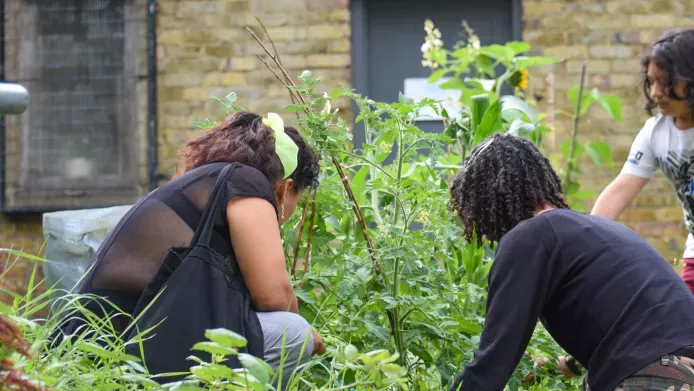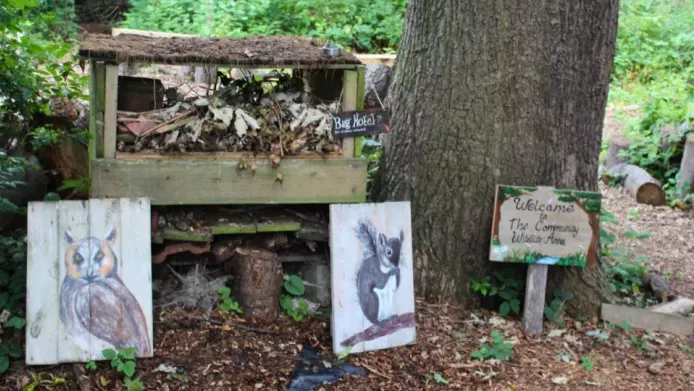St Vincent's Social Enterprise in Bradford provides free migrant support, training, and opportunities to the local community. They joined the Grow Wild Community Programme to bring colour and life to their unused community garden. We spoke to the project leaders about the impact of the project.
Read on to hear what the project leaders from St Vincent’s had to say about the impact of the project.
The Grow Wild project has been a great way to introduce people already accessing services from our centre to the garden and gardening skills. With the Grow Wild funding, we have built a sensory garden, planters and wheelchair accessible pathways with permeable paving. We wanted to make the garden somewhere accessible for people who don’t want to or aren’t able to get involved with physical gardening.
This is why we developed the sensory garden, an immersive space where people can sit, smell, touch and listen to the plants and wildflowers. It's now a really relaxing spot to sit overlooking the garden and towards the centre of Bradford in the distance.
We wanted to make the garden somewhere accessible for people who don’t want to or aren’t able to get involved with physical gardening.

The project has been donated an awning which we have put above the seating to provide some shade. In the garden we’ve planted 300 wildflower bulbs, and native plug plants such as field scabious (Knautia arvensis), meadow clary (Salvia pratensis) and common quaking grass (Briza media). Around the entrance to the garden, we’ve built and installed planters, filled with foxgloves, hollyhocks, and campanula. On the fence by the entrance, we’ve put in climbing plants including honeysuckle and hops but we’re also planting a hedge adjacent to the fence, with trees donated by the Woodland Trust.
Groups such as Little Seedlings - a weekly children's gardening group, where we sow seeds, paint, play in our mud kitchen, and search for wildlife - are now being hosted in the garden and a local nursery has begun to regularly join our gardening sessions.

Through the use of an accessible, outdoor space we're able to impact younger audiences. We intend to host more gardening sessions targeted towards younger participants and we will gradually expand our offer for all ages.
Through the use of an accessible, outdoor space we're able to impact younger audiences.
Previously an area around the side of the garden was quite overgrown and retaining water. Since we’ve installed drainage and cleared out the space the kids can use the whole garden. When doing this work we realised there were a lot of stray cats living in the overgrowth, so we've decided to make some eco-friendly cat houses for the animals to sleep in.
We’ve also added habitats for insects including bug hotels and rock piles. Over the summer the garden was full of butterflies, bees, beetles, and ladybirds (who have been helping to keep the aphid population under control).

The project has had a large impact on our volunteers. It’s good to see that when they've got ownership of ideas and things related to the project, everyone cooperates and gets something out of it. One of our volunteers took on gardening at the start of the project and became fully invested, he’s now signed up for a gardening course at his local college. The staff also use the community garden during their breaks, recently for World Mental Health Day all the centre staff came out into the garden to spend time with each other.
One of our volunteers took on gardening at the start of the project and became fully invested, he’s now signed up for a gardening course at his local college.

Our main group of volunteer gardeners is our Probation Group that visit each week. They created the sensory garden and are helping to build a new polytunnel which will contain wooden pallets and planters inside. This aspect is going to be a big part of our garden, because then we can hopefully grow fruit and veg to use for food parcels and in our community café.
‘I look forward to coming. Even though it’s hard work, it’s also like taking a break - I can see the benefit with my mental health, taking my mind off things and seeing how we are helping other people. […] I think the space is fantastic, even when I finish my order, I will still come and have a look around. I think when you’ve invested so much time and energy into a project you want to see the finished outcome.’
St Vincent’s Garden Probation Group member
An unexpected thing at first was how difficult it is to get people to the garden which is tucked away. Community outreach on top of all the other work involved in the project is really challenging. However, in the summer we had a gardening event and garden party which was a good way of getting new visitors to the garden. The good thing about our location is that we can cater our programming to our community; if someone brings us an idea for a group, we're more than open to host it. In such an urban area use of the garden is a big deal to the people and families that come here.
The Grow Wild Community Programme has been a massive help in getting our garden project off the ground and creating a welcome, safe space for our community. As there are staff working in the centre seven days a week, we see that there are always customers newly discovering the space during their visit.
More about Grow Wild funded projects

Previous projects


